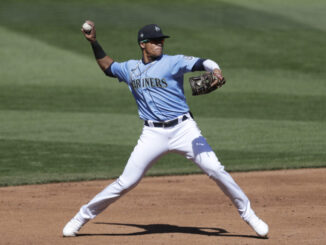
On Friday, August 25th, the Seattle Mariners defeated the New York Yankees 2-1 in 11 innings in a game that the national media would highlight, not so much for the Mariners win but, for the failure of Aroldis Chapman to shut down the Mariners in the top of the eleventh. Yankees manager Joe Girardi would remove Chapman from the closer role shortly thereafter. For the Mariners, the victory improved their record to 66-63, three games over .500 – the high-water mark for the season – and pulled them to within half a game for the second wild card position in the American League. The Mariners haven’t won since.
After losing the final two games of the Yankees series, the Mariners were swept by the Baltimore Orioles despite scoring thirteen runs combined in games one and three. The shutout by Orioles pitcher Dylan Bundy in game two was a lost cause from the get go. So, after a promising 5-2 start to the crucial late August road trip, the Mariners will return home having completed a dismal 5-7 stretch to begin facing off fairly regularly with AL West rivals in the September stretch.
If this last week’s futility sounds familiar, it’s because it’s really familiar. On August 9th, the M’s completed a two-game sweep of the Oakland A’s in the bay area to improve their record to 59-56, three games over .500. They triumphantly returned to Seattle to face their division rival Los Angeles Angels. An impressive Thursday night crowd of 35,021 greeted their conquering heroes and were treated to a thrilling three run come from behind in the eighth to tie, only to see closer Edwin Diaz cough up three more in the top of the ninth to blow the game. LA would go on to sweep the four-game series and those pesky Orioles would mash 11-3 in the first game of their three-game series to extend the Mariners losing streak to five – yes five just like the last five – to put the Mariners back under .500.
The Cruelty of the Second Wild-Card
The perversity of August has been that the looming second wild card slot has made the Mariners seem more like contenders than they actually are. In between Dave Sim’s arcane references to a player competing for the “batting title” or Mike Blowers’ running tally of in game “batting average with runners in scoring position” – a completely arbitrary observation in a ridiculously small sample size – Mariners fans have been treated to incessant score board watching with an emphasis on the number of games separating the wild-card. What this completely misses is the fact that none of the teams jockeying for that final spot are any good (and lately the same case can be made for the Yankees in the first wild-card spot)
The simple fact is that the Minnesota Twins, Los Angeles Angels, Baltimore Orioles, Texas Rangers, Tampa Bay Rays, Kansas City Royals, and the Mariners, all teams within four games of a post season entry ticket, all range from fundamentally flawed to simply bad baseball teams. The Yankees are slightly less flawed – youth and inexperience is a good flaw to have. But, while post-season baseball ins completely different from regular season baseball, given the immediacy of one-and-done in the play-in and the subsequent randomness of short series, it is hard to imagine ANY of these teams defeating the Boston Red Sox or the Cleveland Indians or the Houston Astros.
That simply isn’t the case in the NL. While the Colorado Rockies do seem to be more smoke and mirrors than their record would suggest. The Arizona Diamondbacks have been laying the wood to the once invincible Los Angeles Dodgers in recent meetings. One could see a Diamondbacks team in an upset making the NLCS, whereas the Mariners or Twins don’t inspire that degree of optimism.
For the most part, the introduction of the second wild-card team has been an energizer for a sport that suffers from the inflection of college and then professional football right at the moment on the calendar whent the games become important. This season, at least in the American League in general and for Mariners fans in particular, the goal of the second wild card just seems cruel.



